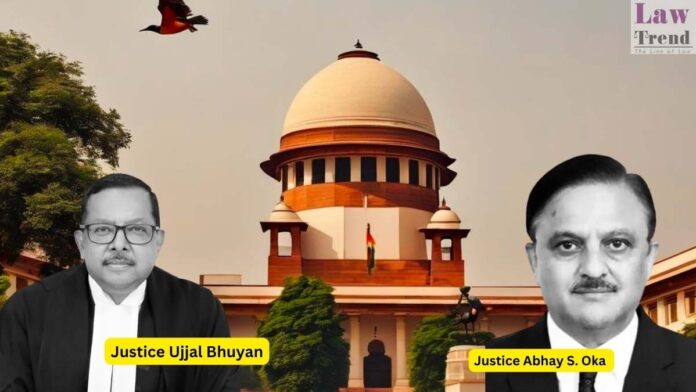In a significant development, the Supreme Court on Wednesday issued contempt notices to the Chief Secretaries of six states for failing to comply with its directions regarding post-retirement entitlements for former High Court Judges. The states facing action are Chhattisgarh, Jharkhand, Maharashtra, Telangana, West Bengal, and Delhi.
A bench comprising Justice Abhay S. Oka and Justice Ujjal Bhuyan observed that these states had not adhered to six critical directions previously laid down by the Court. These include ensuring parity of benefits with sitting Judges, allowing reimbursement without prior State approval, delegating sanctioning authority to Registrar Generals, permitting reimbursements for treatments undertaken outside the home state, providing cashless medical facilities, and extending domestic help and telephone allowances.
“As far as states of Chhattisgarh, Jharkhand, Maharashtra, Telangana, West Bengal and Delhi are concerned, they have not complied with all the directions issued by this Court,” the bench stated, adding, “Issue notice to Chief Secretaries of the aforesaid states, calling upon them to show cause as to why action under the Contempt of Courts Act should not be initiated.”
The contempt notices are returnable on July 25, 2025. While the Court has currently dispensed with the personal presence of the Chief Secretaries, it mandated that a responsible Indian Administrative Service (IAS) officer must be present on the next hearing date, either physically or via video conference.
Criticizing the bureaucratic inertia, Justice Oka remarked, “A simple thing, you have to issue a notice granting benefits on par with Andhra Pradesh, even that takes so many months.”
The issue stems from the Court’s February 18, 2025 ruling, which clarified that post-retirement reimbursements must be handled by the State Government where the High Court in question is located. On April 15, the Court warned that further non-compliance could result in contempt proceedings and emphasized that the responsible state could either be the one where the Judge first served or retired.
During its April 29 review, the Court noted that Andhra Pradesh had fully complied with the prescribed benefits, based on its 2021 Rules. Consequently, all other states were directed to align their policies accordingly. States like Goa, Gujarat, Tamil Nadu, and Uttar Pradesh were specifically instructed to implement similar measures, while Bihar was asked to offer retired Judges a choice between its 2019 Rules and Andhra Pradesh’s 2021 framework.
Madhya Pradesh was earlier criticized for delays in implementing cashless medical treatment, with the Court overruling its six-month timeline and demanding immediate amendments to facilitate emergency treatment reimbursements.
In a lenient move, the Supreme Court granted the Union Territories of Andaman and Nicobar Islands, Dadra and Nagar Haveli and Daman and Diu, and Lakshadweep an extension of one month to comply with the directives.
The current contempt action stems from a broader order warning multiple states and Union Territories — including Kerala, Meghalaya, Mizoram, Puducherry, and Ladakh — of possible legal consequences if they failed to ensure compliance by May 21, 2025.




